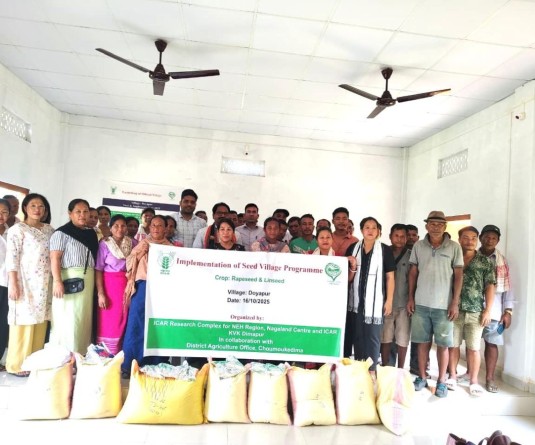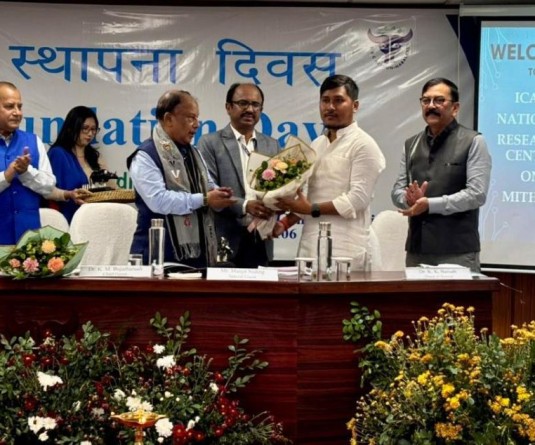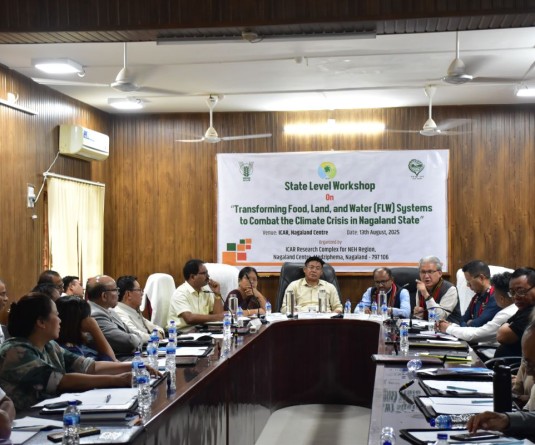
Dr Bendangla Imsong and Dr Phool Kumari
Natural farming is a method of farming that works with nature, minimizing human intervention and avoiding the use of synthetic fertilizers, pesticides, and even organic inputs like compost and manure. It is based on the principle that nature is self-sufficient and can sustain crops without external inputs if the right conditions are maintained. The key principles of natural farming are No synthetic chemicals, No tillage (No plowing or turning of Soil), No weeding (Weeds are not removed completely), No dependence on external inputs, Use of mulching and cover crops and Encouragement of indigenous microorganisms. Zero Budget Natural Farming (ZBNF) which has been developed by Subhash Palekar, ZBNF promotes farming without external inputs, using natural preparations like Jeevamrutha (fermented microbial solution) and Fukuoka’s "Do-Nothing" Farming (Masanobu Fukuoka, a Japanese farmer and philosopher, pioneered natural farming by emphasizing minimal human intervention, allowing nature to take its course) are popular forms of natural farming
The benefits of natural farming lie in improvement of soil fertility and biodiversity; reduction in input costs; environmentally sustainable with lower water consumption and enhanced food safety by eliminating chemical residues. There are challenges of natural farming as well which are reduction in yields due to initial transition period, require deep knowledge of ecological balance.
Organic farming is a method of agriculture that relies on natural processes, biodiversity, and ecological balance to grow crops and raise livestock. It avoids synthetic fertilizers, pesticides, genetically modified organisms (GMOs), and artificial additives, promoting a healthier and more sustainable farming system. Organic farming avoids chemical fertilizers, pesticides, and herbicides, using natural alternatives instead. Practices like composting, green manure, crop rotation, and cover cropping maintain soil fertility and structure are adopted. Growing different crops in cycles helps control pests naturally, improves soil nutrients, and prevents soil degradation. Biological pest control, natural predators, neem-based pesticides, and manual weeding replace synthetic chemicals. Organic farming prohibits the use of genetically modified seeds and crops. Composting, crop rotation, biological pest control, mulching, green manuring are some of the techniques used in organic farming. The benefits of Organic Farming are:
- Healthier Food – Free from synthetic chemicals, GMOs, and harmful residues.
- Environmental Sustainability – Protects biodiversity, reduces pollution, and conserves soil and water.
- Better Soil Quality – Organic practices enhance soil fertility and microbial life.
- Supports Farmers – Reduces dependency on costly synthetic fertilizers and pesticides.
However, it may also be taken into considerations that organic farms may produce less than conventional farms. Organic produce is often more expensive due to labor-intensive methods and certification requirements. Getting organic certification (e.g., USDA Organic, EU Organic) can be costly and time-consuming.
Natural farming and organic farming share similarities but have key differences in philosophy, techniques, and inputs.
1. Philosophy & Approach
- Natural Farming: Focuses on working with nature, minimizing human intervention, and avoiding all external inputs. It follows principles like "do nothing" farming (popularized by Masanobu Fukuoka).
- Organic Farming: Uses natural inputs but allows for some human intervention, such as composting, crop rotation, and organic fertilizers.
2. Use of External Inputs
- Natural Farming: No synthetic or even organic fertilizers, pesticides, or compost. Farmers rely on natural soil fertility, cover crops, and mulching.
- Organic Farming: Uses organic inputs like compost, manure, bio-fertilizers, and permitted natural pesticides.
3. Soil Management
- Natural Farming: Encourages microorganisms and soil health through minimal disturbance, mulching, and indigenous microorganisms.
- Organic Farming: Focuses on enhancing soil health through compost, crop rotation, and organic soil amendments.
4. Pest & Weed Control
- Natural Farming: Uses natural predators, beneficial microbes, and plant diversity to manage pests. Weeds are considered part of the ecosystem.
- Organic Farming: Uses organic pesticides, companion planting, crop rotation, and manual weed removal.
5. Certification & Regulations
- Natural Farming: No certification system; relies on traditional or self-sustained methods.
- Organic Farming: Certified under national and international organic standards (e.g., USDA Organic, EU Organic).
6. Productivity & Sustainability
- Natural Farming: Focuses on long-term soil fertility and self-sustaining ecosystems, but may have lower short-term yields.
- Organic Farming: More structured than natural farming, with better yields than natural farming but lower than conventional farming.
Conclusion:
Natural farming is a more extreme form of sustainable agriculture with minimal human intervention, while organic farming allows for controlled, certified practices using natural inputs.
Dr Bendangla Imsong, CTO (Plant Breeding) and Dr Phool Kumari, Senior Scientist cum Head, KVK Dimapur






